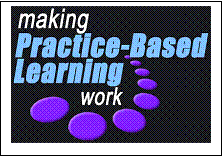Reflection
We hope you have enjoyed working through this section
- Can you outline the reasons why professional practice education is important to all the stakeholders involved?
- Are you able to list three of the approaches to learning discussed in the section on teaching and learning, and say how they relate to professional practice education?
- Can you describe the characteristics of your own preferred learning style?
- Are you able to recognise the needs and expectations of students on practice placement?
- Are you able to recognise your own needs and expectations as a new practice educator?
You may find it helpful to 'test' yourself by writing down brief answers to these questions, and then checking them against the relevant sections.
If you are unsure of any of these areas, spend a little while going back over the material.
Part 1 of this document can also be found as part of The Making Practice - Based Learning Work Project at www.practicebasedlearning.org as 'An introduction to practice education'. This web site also has a variety of resources which will be useful for you as a practice educator.
Expectations of the practice educator
These are some thoughts generated by a group of practice educators. Don't be put off it you don't get them all.
Knowledge:
Clinical - of speciality
- of routines
- of working practices
Multi-/inter-disciplinary team, and relevance to individual profession
Policies, procedures and legislation
Induction - fire regulations, Health and Safety, lifting and handling
Code of Ethics
Of student - learning style
- experience, interests
- 'baseline' of knowledge and skills
Self, and own strengths and weaknesses
Own work area and resources available elsewhere
Level of placement student is undertaking - University requirements, eg. written work
- course structure
- assessment procedures
Abilities to:
prepare/plan appropriate induction
arrange timetable for self/student/other members of team where appropriate
impart clinical skills
share knowledge at the appropriate level and in an appropriate style
assess - being non-threatening and open-minded
observe
communicate
manage time in relation to cases and student
reflect on own and student's performance
support effectively through formal and informal supervision
delegate appropriate cases to student
identify stress and manage it effectively - own and student's
be able to give constructive support and criticism
Qualities and attitudes
approachable
friendly
warm
organised
supportive
honest/open
real/genuine
positive
enthusiastic
reliable
knowledgeable
sense of humour
adaptable
good listener
professional - can give leadership, show respect to service users, work in multi-disciplinary team
facilitator
'juggler'
not over-protective
clear - not giving out mixed messages
patient
interested in student
appear confident in role (even if don't feel it!)
non-judgemental
enthusiastic
flexible
respectful of student's needs and situation
tolerant
committed
self-aware
objective - fair and firm
